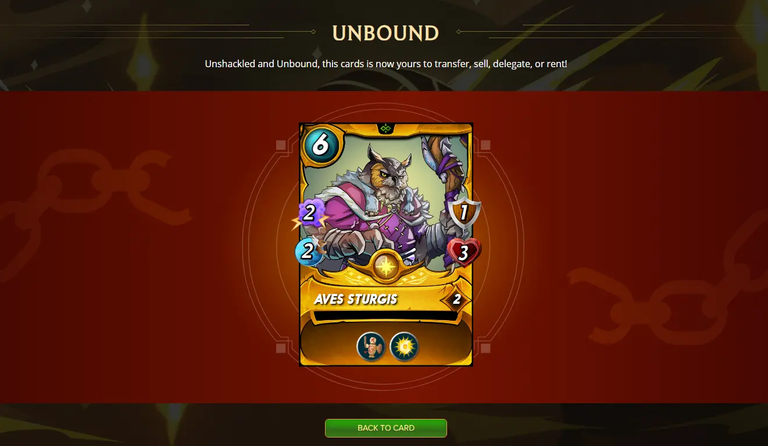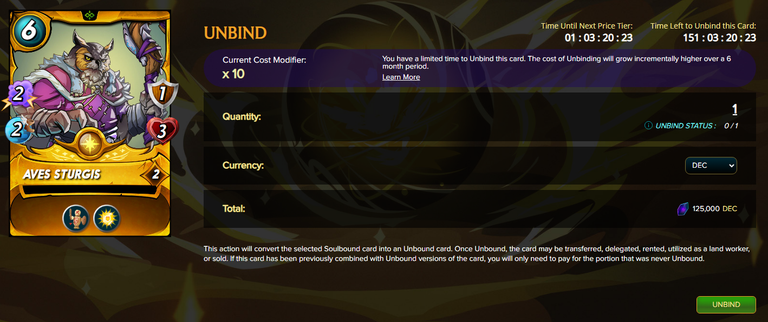
As some of you know, I have a Gold Foil Aves Sturgis in my collection. In order to trade it on the market, it was necessary to pay a fee of 125,000 DEC to unlock it (As of this publication, the fee is 137,500 DEC). On 09/13/2024, I decided to take this step and acquire the necessary DECs.

Purchasing DECs
I performed 6 operations to reach the desired quantity. Here is a summary of the transactions:
| Operation | DEC Quantity | DEC Price (Hive) | Total Hive |
|---|---|---|---|
| 1 | 33,207.658 | 0.00430481 | 142.95265823 |
| 2 | 90,928.245 | 0.00431162 | 392.04803971 |
| 3 | 19.551 | 0.004305 | 0.08416706 |
| 4 | 15.285 | 0.00430483 | 0.06579933 |
| 5 | 14.208 | 0.00431139 | 0.06125623 |
| 6 | 815 | 0.00431139 | 3.51378285 |
| Total | 124,999.947 | 538.72570340 |
With the price of Hive at $0.1774 on the day of the transaction, the total cost to acquire the 125,000 DEC was approximately $95.57.



Scarcity and Upside Potential

With only 1,963 Aves Sturgis cards in circulation and only 18 of them unlocked so far, the scarcity of the card in the market is evident. In my view, this factor, combined with the progressive increase in the unlock cost and the deadline to do so, contributes to the potential for Gold Foil Aves Sturgis to appreciate in the future.
Gold Foil Aves Sturgis Market Analysis and Rental Strategy
After unlocking the card, I decided not to put it up for sale immediately, looking for the best time to maximize profit. However, I chose to make it available for rent for 80 DEC per day. This strategy aims to accumulate DECs to be sold later, increasing the profit margin and diluting the initial unlocking cost.
Previously, the Hive used to buy the DECs were allocated to the Swap.Hive-SPS pool, which yielded US$ 0.0648 per day. In the 9 days since removing the Hive from the pool, I have failed to receive US$ 0.5832 in dividends. Considering that the card rental and the pool dividends are recurring revenues, we can compare their current values.
With the SPS price at $0.0080551 and DEC at $0.0007864, the daily rent of 80 DEC is equivalent to $0.0629 (80 * 0.0007864). Comparing this to the pool's yield of $0.0648, we can say that the values are practically the same, only changing the way of receiving.
Hive: Hold, Unlock and Rent?
Considering that the Hive price today is $0.1973, the current value of Hive would be $106.32 (538.725 * 0.1973).
Compared to the unlock cost of $95.57, the appreciation of Hive would have provided a profit of $10.75 (106.32 - 95.57).
If the card were sold at the recent average price of $139.81, the profit would be $44.24 (139.81 - 95.57). If we consider the current selling price of $159, the profit would be even higher, reaching $63.43 (159 - 95.57).
With the rental strategy, the profit will depend on the time the card remains rented and the variation in the price of DEC. For each day of rental, I accumulate $0.0629, which helps to dilute the initial unlock cost and increase the profit margin on the eventual sale of the card.
The Future of DEC and the Long-Term Strategy
The DEC, as an asset, aims to be indexed to US$ 1 for every 1000 DEC. Several factors can influence its price in the market, causing it to be traded below this value, as we are currently observing. However, in the long term, the expectation is that the DEC will approach its indexation.
While the SPS has its price defined by the market and the functionalities it offers, the DEC seeks to remain stable in relation to the dollar. This fundamental difference impacts investment strategies.
My strategy of accumulating DECs through the rental of Aves Sturgis Dourada is aimed at a long-term scenario, where the DEC is expected to appreciate in relation to its current price.
Conclusion
When deciding how to deal with the Gold Foil Aves Sturgis (keep the Hive, sell the card, rent it), I took into account not only the factors mentioned above (Hive appreciation, market price of the card, DEC potential), but also time as a crucial element.
The increasing cost to unlock the card and the deadline to do so create a sense of urgency, and the longer I wait, the higher this cost will be. The scarcity of the card and the possibility of future appreciation was also a factor I took into account.


Como alguns de vocês sabem, possuo uma Aves Sturgis Dourada em minha coleção. Para poder negociá-la no mercado, foi necessário pagar uma taxa de 125.000 DEC para desbloqueá-la (Na data dessa publicação a taxa está em 137.500 DEC). No dia 13/09/2024, decidi dar esse passo e adquirir os DECs necessários.

A Compra dos DECs
Realizei 6 operações para atingir a quantidade desejada. Segue um resumo das transações:
| Operação | Quantidade DEC | Preço DEC (Hive) | Total Hive |
|---|---|---|---|
| 1 | 33.207,658 | 0,00430481 | 142,95265823 |
| 2 | 90.928,245 | 0,00431162 | 392,04803971 |
| 3 | 19,551 | 0,004305 | 0,08416706 |
| 4 | 15,285 | 0,00430483 | 0,06579933 |
| 5 | 14,208 | 0,00431139 | 0,06125623 |
| 6 | 815 | 0,00431139 | 3,51378285 |
| Total | 124.999,947 | 538,72570340 |
Com o preço do Hive em US$ 0,1774 no dia da transação, o custo total para adquirir os 125.000 DEC foi de aproximadamente US$ 95,57.



Escassez e Potencial de Valorização

Com apenas 1.963 cartas Aves Sturgis em circulação e somente 18 delas desbloqueadas até o momento, a escassez da carta no mercado é evidente. Na minha visão, esse fator aliado ao aumento progressivo do custo de desbloqueio e ao prazo limite para fazê-lo, contribui para o potencial de valorização da Aves Sturgis Dourada no futuro.
Análise do Mercado da Aves Sturgis Dourada e Estratégia de Aluguel
Após desbloquear a carta, decidi não colocá-la à venda imediatamente, buscando o melhor momento para maximizar o lucro. No entanto, optei por disponibilizá-la para aluguel por 80 DEC ao dia. Essa estratégia visa acumular DECs para serem vendidos posteriormente, aumentando a margem de lucro e diluindo o custo inicial do desbloqueio.
Anteriormente, os Hive utilizados para comprar os DECs estavam alocados na pool Swap.Hive-SPS que rendia US$ 0,0648 por dia. Nos 9 dias desde a retirada do Hive da pool, deixei de receber US$ 0,5832 em dividendos. Considerando que o aluguel da carta e os dividendos da pool são receitas recorrentes, podemos comparar os seus valores atuais.
Com o preço do SPS em US$ 0,0080551 e o DEC em US$ 0,0007864, o aluguel diário de 80 DEC equivale a US$ 0,0629 (80 * 0,0007864). Comparando com o rendimento da pool de US$ 0,0648, podemos dizer que os valores estão praticamente empatados, apenas alterando a forma de recebimento.
Hive: Manter, Desbloquear e Alugar?
Considerando que o preço do Hive hoje está em US$ 0,1973, o valor atual dos Hive seria de US$ 106,32 (538,725 * 0,1973).
Comparando com o custo de desbloqueio de US$ 95,57, a valorização do Hive teria proporcionado um lucro de US$ 10,75 (106,32 - 95,57).
Se a carta fosse vendida pelo preço médio recente de US$ 139,81, o lucro seria de US$ 44,24 (139,81 - 95,57). Se considerarmos o preço de venda atual de US$ 159, o lucro seria ainda maior, chegando a US$ 63,43 (159 - 95,57).
Com a estratégia de aluguel, o lucro dependerá do tempo que a carta permanecer alugada e da variação do preço do DEC. A cada dia de aluguel, acumulo US$ 0,0629, que contribue para diluir o custo inicial do desbloqueio e aumentar a margem de lucro na eventual venda da carta.
O Futuro do DEC e a Estratégia de Longo Prazo
O DEC, como ativo, tem como objetivo ser indexado a US$ 1 a cada 1000 DEC. Diversos fatores podem influenciar seu preço no mercado, fazendo com que ele seja negociado abaixo desse valor, como observamos atualmente. No entanto, a longo prazo, a expectativa é que o DEC se aproxime da sua indexação.
Enquanto o SPS tem seu preço definido pelo mercado e pelas funcionalidades que oferece, o DEC busca manter-se estável em relação ao dólar. Essa diferença fundamental impacta as estratégias de investimento.
Minha estratégia de acumular DECs através do aluguel da Aves Sturgis Dourada é visando um cenário de longo prazo, onde se espera que o DEC se valorize em relação ao seu preço atual.
Conclusão
A decisão de como lidar com a Aves Sturgis Dourada (manter os Hive, vender a carta, alugar), levei em consideração não apenas os fatores mencionados anteriormente (valorização do Hive, preço de mercado da carta, potencial do DEC), mas também o tempo como elemento crucial.
O custo crescente para desbloquear a carta e o prazo limite para fazê-lo criam um senso de urgência, e quanto mais eu demorasse, maior seria esse custo. A escassez da carta e a possibilidade de valorização futura também foi um fator que levei em consideração.



